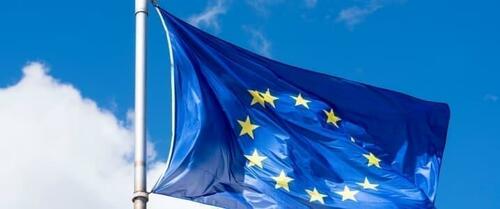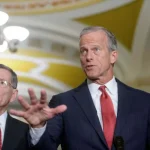
Authored by Irina Slav via OilPrice.com,
-
Internal divisions are deepening within the EU as countries attempt to lower the price of natural gas while also ensuring they secure enough of it.
-
Germany’s decision to announce a 200-billion-euro aid package to ease its domestic crisis while opposing a price cap has angered some members.
-
EU leaders are meeting again towards the end of the month, and they will aim to find a gas price policy that can please all its members and, most importantly, the sellers.
The European Union’s leaders have been hard at work trying to find ways to ensure both the security and affordability of energy in the bloc over the past few months. Initially focusing on the security part, affordability has now claimed the spotlight.
As heating season begins, EU member states are turning on each other in their increasingly desperate attempts to secure enough gas to last until spring and to ensure that it is affordable. Some believe this could indeed lead to radical measures that would lower prices. Others are not so sure.
The EU’s energy ministers have been meeting regularly over the past few weeks to discuss possible measures for ensuring the supply of gas for all member states in a situation where the largest supplier of the bloc, Russia, is gone for, many believe, good.
Norway has stepped up, so has the United States, and even the UAE has agreed to send five cargoes of LNG to Germany next year. But that’s next year. Now, Europe needs more gas, and it needs it on the cheap. Its options are not exactly unlimited.
A group of 15 member states suggested last month that the EU caps the price of all gas imports to manage its expenses. They did not comment on what LNG sellers might have to say about that idea, insisting that this was the only way to ensure gas is affordable for Europeans in what is shaping up to be the harshest winter for Europe in generations, regardless of the weather.
Then a smaller group came up with a more precise idea for the caps. The idea is to set up a so-called gas price corridor, or a range, that is lower than market prices but moves with them. According to the authors—Belgium, Greece, Italy, and Poland—this corridor could also apply to long-term contracts. Again, it seems that nobody consulted the sellers.
The Commission has spoken against price caps for non-Russian gas imports. Instead of a blanket cap, President Ursula von der Leyen proposed capping the price of natural gas used to generate electricity. Discussions continue, but hostility within the EU is growing, making the need to decide on working measures all the more urgent.
Germany, for instance, has managed to turn a lot of European states against it after it announced a 200-billion-euro aid package for businesses and households to cope with soaring energy prices. Naturally, less wealthy EU members weren’t happy with that. They were even less happy that Germany opposed a gas price cap.
“If Germany acts only on the national level what they might be doing is really compromising the economic stability of Europe and also jeopardizing the political unity,” Simone Tagliapietra, research fellow at Belgian NGO Bruegel, told the Wall Street Journal.
The WSJ noted in a report on the gas discussions in Europe that the internal tensions in the bloc could in fact help it become more decisive about crisis measures and ultimately agree to a gas price cap.
This, the authors of the report argued, would not be the best news for LNG exporters, but they could agree to sell their LNG at a lower price to avoid a deep recession in Europe that would destroy longer-term gas demand.
On the other hand, a report in Euronews quoted energy experts as warning that a price cap on gas imports would “end the market as we know it.” One of these experts, Elisabetta Cornago, a senior energy researcher at the Centre for European Reform, told Euronews that the EU was looking at gas prices without reference to other factors, and that reference needed to be made, because “Prices are high because of scarcity.”
Indeed, capping gas prices will not be enough. There is simply not enough LNG and pipeline gas outside Russia for Europe to breeze through winter as usual. And there are not enough regasification terminals in Europe to ensure an even supply of gas across the bloc.
Under pressure, the EU is turning on the ones that do supply it with gas. Euractiv reported this month that complaints about Norway’s revenues from its higher gas exports to the bloc are growing louder. In Germany, Economy Minister Habeck and an MP separately accused the U.S. of charging too much for its LNG. Tensions are running high.
EU leaders are meeting again towards the end of the month. By then, hopes are that they will have tailored a decision on gas prices that would provide some relief to struggling economies facing a recession.
Yet hopes are elusive. Hoping is one thing, but getting everyone to work together to make those hopes a reality is another thing altogether. With increasingly deep divisions within the bloc that has been calling for unity and solidarity in a time of adversity, it is difficult to see a workable decision being made anytime soon that would satisfy all members. And we have yet to hear from the gas sellers.
Authored by Irina Slav via OilPrice.com,
-
Internal divisions are deepening within the EU as countries attempt to lower the price of natural gas while also ensuring they secure enough of it.
-
Germany’s decision to announce a 200-billion-euro aid package to ease its domestic crisis while opposing a price cap has angered some members.
-
EU leaders are meeting again towards the end of the month, and they will aim to find a gas price policy that can please all its members and, most importantly, the sellers.
The European Union’s leaders have been hard at work trying to find ways to ensure both the security and affordability of energy in the bloc over the past few months. Initially focusing on the security part, affordability has now claimed the spotlight.
As heating season begins, EU member states are turning on each other in their increasingly desperate attempts to secure enough gas to last until spring and to ensure that it is affordable. Some believe this could indeed lead to radical measures that would lower prices. Others are not so sure.
The EU’s energy ministers have been meeting regularly over the past few weeks to discuss possible measures for ensuring the supply of gas for all member states in a situation where the largest supplier of the bloc, Russia, is gone for, many believe, good.
Norway has stepped up, so has the United States, and even the UAE has agreed to send five cargoes of LNG to Germany next year. But that’s next year. Now, Europe needs more gas, and it needs it on the cheap. Its options are not exactly unlimited.
A group of 15 member states suggested last month that the EU caps the price of all gas imports to manage its expenses. They did not comment on what LNG sellers might have to say about that idea, insisting that this was the only way to ensure gas is affordable for Europeans in what is shaping up to be the harshest winter for Europe in generations, regardless of the weather.
Then a smaller group came up with a more precise idea for the caps. The idea is to set up a so-called gas price corridor, or a range, that is lower than market prices but moves with them. According to the authors—Belgium, Greece, Italy, and Poland—this corridor could also apply to long-term contracts. Again, it seems that nobody consulted the sellers.
The Commission has spoken against price caps for non-Russian gas imports. Instead of a blanket cap, President Ursula von der Leyen proposed capping the price of natural gas used to generate electricity. Discussions continue, but hostility within the EU is growing, making the need to decide on working measures all the more urgent.
Germany, for instance, has managed to turn a lot of European states against it after it announced a 200-billion-euro aid package for businesses and households to cope with soaring energy prices. Naturally, less wealthy EU members weren’t happy with that. They were even less happy that Germany opposed a gas price cap.
“If Germany acts only on the national level what they might be doing is really compromising the economic stability of Europe and also jeopardizing the political unity,” Simone Tagliapietra, research fellow at Belgian NGO Bruegel, told the Wall Street Journal.
The WSJ noted in a report on the gas discussions in Europe that the internal tensions in the bloc could in fact help it become more decisive about crisis measures and ultimately agree to a gas price cap.
This, the authors of the report argued, would not be the best news for LNG exporters, but they could agree to sell their LNG at a lower price to avoid a deep recession in Europe that would destroy longer-term gas demand.
On the other hand, a report in Euronews quoted energy experts as warning that a price cap on gas imports would “end the market as we know it.” One of these experts, Elisabetta Cornago, a senior energy researcher at the Centre for European Reform, told Euronews that the EU was looking at gas prices without reference to other factors, and that reference needed to be made, because “Prices are high because of scarcity.”
Indeed, capping gas prices will not be enough. There is simply not enough LNG and pipeline gas outside Russia for Europe to breeze through winter as usual. And there are not enough regasification terminals in Europe to ensure an even supply of gas across the bloc.
Under pressure, the EU is turning on the ones that do supply it with gas. Euractiv reported this month that complaints about Norway’s revenues from its higher gas exports to the bloc are growing louder. In Germany, Economy Minister Habeck and an MP separately accused the U.S. of charging too much for its LNG. Tensions are running high.
EU leaders are meeting again towards the end of the month. By then, hopes are that they will have tailored a decision on gas prices that would provide some relief to struggling economies facing a recession.
Yet hopes are elusive. Hoping is one thing, but getting everyone to work together to make those hopes a reality is another thing altogether. With increasingly deep divisions within the bloc that has been calling for unity and solidarity in a time of adversity, it is difficult to see a workable decision being made anytime soon that would satisfy all members. And we have yet to hear from the gas sellers.







